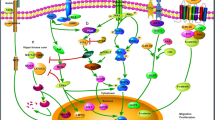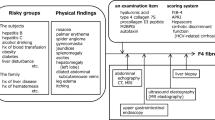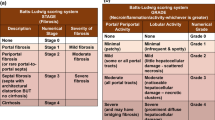Abstract
Background and Aims
A large-scale multicenter study validated aldo–keto reductase 1B10 (AKR1B10) as a new serum marker of hepatocellular carcinoma (HCC). This study aimed to evaluate the prognostic value of serum AKR1B10 in HCC.
Methods
273 naïve HCC patients enrolled for serum AKR1B10 tests were followed up for 2 years. Survival and clinical data were collected. Kaplan–Meier survival analysis and log-rank tests were used to estimate correlation of patient survival with serum AKR1B10. Univariate and multivariate COX regression analyses were used to evaluate the prognostic value of serum AKR1B10 level independently or in combination with other clinicopathological factors. α-fetoprotein (AFP) was analyzed in parallel for comparison.
Results
Serum AKR1B10 associated with tumor stage (p = 0.012), size (p = 0.004), primary tumor number (p = 0.019), and Child–Pugh classification (p = 0.003). HCC patients with a high level of serum AKR1B10 (≥ 267.9 pg/ml) had median survival (MS) of 25 months (95% confidence interval [CI] 20.788–29.212) vs. MS of 34 months (CI 28.911–39.089) in patients with normal serum AKR1B10 (p < 0.001). Univariate and multivariate COX regression analyses showed that serum AKR1B10 level was an unfavorable prognostic marker of HCC independently (HR 1.830, 95% CI 1.312–2.552; p < 0.001) or in combination with other clinical factors (HR 1.883, 95% CI 1.264–2.806; p = 0.002), such as TNM stage, tumor size and portal invasion. In the same cohort of HCC patients, AFP exhibited prognostic value at a cut-off of 400 ng/ml, but not at 20 ng/ml and 200 ng/ml.
Conclusions
Serum AKR1B10 is a new prognostic marker of HCC, better than AFP.





Similar content being viewed by others
References
Akinyemiju T, Abera S, Global Burden of Disease Liver Cancer C, et al. The burden of primary liver cancer and underlying etiologies from 1990 to 2015 at the global, regional, and national level: results from the global burden of disease study 2015. JAMA Oncol. 2017;3:1683–91.
Ozakyol A. Global epidemiology of hepatocellular carcinoma (HCC Epidemiology). J Gastrointest Cancer. 2017;48:238–40.
European Association for the Study of the Liver. Electronic address eee, European Association for the Study of the L. EASL Clinical Practice Guidelines: Management of hepatocellular carcinoma. J Hepatol 2018 69:182–236.
Luo DX, Huang MC, Ma J, et al. Aldo-keto reductase family 1, member B10 is secreted through a lysosome-mediated non-classical pathway. Biochem J. 2011;438:71–80.
Luo D, Bu Y, Ma J, et al. Heat shock protein 90-alpha mediates aldo-keto reductase 1B10 (AKR1B10) protein secretion through secretory lysosomes. J Biol Chem. 2013;288:36733–40.
Liu Z, Yan R, Al-Salman A, et al. Epidermal growth factor induces tumour marker AKR1B10 expression through activator protein-1 signalling in hepatocellular carcinoma cells. Biochem J. 2012;442:273–82.
Cao D, Fan ST, Chung SS. Identification and characterization of a novel human aldose reductase-like gene. J Biol Chem. 1998;273:11429–35.
Tsuzura H, Genda T, Sato S, et al. Expression of aldo-keto reductase family 1 member b10 in the early stages of human hepatocarcinogenesis. Int J Mol Sci. 2014;15:6556–68.
Heringlake S, Hofdmann M, Fiebeler A, et al. Identification and expression analysis of the aldo-ketoreductase1-B10 gene in primary malignant liver tumours. J Hepatol. 2010;52:220–7.
Ye X, Li C, Zu X, et al. A large-scale multicenter study validates AKR1B10 as a new prevalent serum marker for detection of hepatocellular carcinoma. Hepatology. 2019;64:2489.
Shen Y, Zhong L, Johnson S, et al. Human aldo-keto reductases 1B1 and 1B10: a comparative study on their enzyme activity toward electrophilic carbonyl compounds. Chem Biol Interact. 2011;191:192–8.
Yan R, Zu X, Ma J, et al. Aldo-keto reductase family 1 B10 gene silencing results in growth inhibition of colorectal cancer cells: Implication for cancer intervention. Int J Cancer. 2007;121:2301–6.
Balendiran GK, Martin HJ, El-Hawari Y, et al. Cancer biomarker AKR1B10 and carbonyl metabolism. Chem Biol Interact. 2009;178:134–7.
Zhong L, Liu Z, Yan R, et al. Aldo-keto reductase family 1 B10 protein detoxifies dietary and lipid-derived alpha, beta-unsaturated carbonyls at physiological levels. Biochem Biophys Res Commun. 2009;387:245–50.
Zu X, Yan R, Robbins S, et al. Reduced 293T cell susceptibility to acrolein due to aldose reductase-like-1 protein expression. Toxicol Sci. 2007;97:562–8.
Zu X, Yan R, Pan J, et al. Aldo-keto reductase 1B10 protects human colon cells from DNA damage induced by electrophilic carbonyl compounds. Mol Carcinog. 2017;56:118–29.
Ruiz FX, Porte S, Pares X, et al. Biological role of aldo-keto reductases in retinoic Acid biosynthesis and signaling. Front Pharmacol. 2012;3:58.
Ruiz FX, Gallego O, Ardevol A, et al. Aldo-keto reductases from the AKR1B subfamily: retinoid specificity and control of cellular retinoic acid levels. Chem Biol Interact. 2009;178:171–7.
Ma J, Yan R, Zu X, et al. Aldo-keto reductase family 1 B10 affects fatty acid synthesis by regulating the stability of acetyl-CoA carboxylase-alpha in breast cancer cells. J Biol Chem. 2008;283:3418–23.
Wang C, Yan R, Luo D, et al. Aldo-keto reductase family 1 member B10 promotes cell survival by regulating lipid synthesis and eliminating carbonyls. J Biol Chem. 2009;284:26742–8.
Wang C, Xu C, Sun M, et al. Acetyl-CoA carboxylase-alpha inhibitor TOFA induces human cancer cell apoptosis. Biochem Biophys Res Commun. 2009;385:302–6.
Huang C, Cao Z, Ma J, et al. AKR1B10 activates diacylglycerol (DAG) second messenger in breast cancer cells. Mol Carcinog. 2018;57:1300–10.
Fukumoto S-I, Yamauchi N, Moriguchi H, et al. Overexpression of the Aldo-keto reductase family protein AKR1B10 Is highly correlated with smokers’ non-small cell lung carcinomas. Clin Cancer Res. 2005;11:1776–85.
Ma J, Luo DX, Huang C, et al. AKR1B10 overexpression in breast cancer: association with tumor size, lymph node metastasis and patient survival and its potential as a novel serum marker. Int J Cancer. 2012;131:E862–71.
Chung YT, Matkowskyj KA, Li H, et al. Overexpression and oncogenic function of aldo-keto reductase family 1B10 (AKR1B10) in pancreatic carcinoma. Mod Pathol. 2012;25:758–66.
Huang C, Verhulst S, Shen Y, et al. AKR1B10 promotes breast cancer metastasis through integrin alpha5/delta-catenin mediated FAK/Src/Rac1 signaling pathway. Oncotarget. 2016;7:43779–91.
Shi J, Chen L, Chen Y, et al. Aldo-keto reductase family 1 member B10 (AKR1B10) overexpression in tumors predicts worse overall survival in hepatocellular carcinoma. J Cancer. 2019;10:4892–901.
Sato S, Genda T, Hirano K, et al. Up-regulated aldo-keto reductase family 1 member B10 in chronic hepatitis C: association with serum alpha-fetoprotein and hepatocellular carcinoma. Liver Int. 2012;32:1382–90.
Murata A, Genda T, Ichida T, et al. Pretreatment AKR1B10 expression predicts the risk of hepatocellular carcinoma development after hepatitis C virus eradication. World J Gastroenterol. 2016;22:7569–78.
Mori M, Genda T, Ichida T, et al. Aldo-keto reductase family 1 member B10 is associated with hepatitis B virus-related hepatocellular carcinoma risk. Hepatol Res. 2017;47:E85–93.
Schmitz KJ, Sotiropoulos GC, Baba HA, et al. AKR1B10 expression is associated with less aggressive hepatocellular carcinoma: a clinicopathological study of 168 cases. Liver Int. 2011;31:810–6.
Ha SY, Song DH, Lee JJ, et al. High expression of aldo-keto reductase 1B10 is an independent predictor of favorable prognosis in patients with hepatocellular carcinoma. Gut Liver. 2014;8:648–54.
Sonohara F, Inokawa Y, Hishida M, et al. Prognostic significance of AKR1B10 gene expression in hepatocellular carcinoma and surrounding non-tumorous liver tissue. Oncol Lett. 2016;12:4821–8.
Wang YY, Qi LN, Zhong JH, et al. High expression of AKR1B10 predicts low risk of early tumor recurrence in patients with hepatitis B virus-related hepatocellular carcinoma. Sci Rep. 2017;7:42199.
DiStefano JK, Davis B. Diagnostic and Prognostic Potential of AKR1B10 in Human Hepatocellular Carcinoma. Cancers (Basel). 2019;11:486.
Zhu R, Xiao J, Luo D, et al. Serum AKR1B10 predicts the risk of hepatocellular carcinoma a retrospective single-center study. Gastroenterol Hepatol. 2019;42:619.
Han C, Gao L, Zhao L, et al. Immunohistochemistry detects increased expression of aldo-keto reductase family 1 member B10 (AKR1B10) in early-stage hepatocellular carcinoma. Med Sci Monit. 2018;24:7414–23.
Zhang W, Li H, Yang Y, et al. Knockdown or inhibition of aldo-keto reductase 1B10 inhibits pancreatic carcinoma growth via modulating Kras-E-cadherin pathway. Cancer Lett. 2014;355:273–80.
Acknowledgements
We thank Light of Life Biotechnology Ltd., China for providing time‐resolved fluorescent kits for measurements of serum AKR1B10 protein.
Funding
This work was supported in part by Special Projects of Changzhutan National Independent Innovation Demonstration Zone (2018XK2106) and Changsha Municipal Natural Science Foundation (kq2202467).
Author information
Authors and Affiliations
Contributions
XY and DC designed the study. CX and LZ served in data collection. XY, XZ and CX analyzed and interpreted the data and drafted the manuscript. DC revised and finalized the manuscript.
Corresponding authors
Ethics declarations
Conflicts of interest
None.
Additional information
Publisher's Note
Springer Nature remains neutral with regard to jurisdictional claims in published maps and institutional affiliations.
Supplementary Information
Below is the link to the electronic supplementary material.
Rights and permissions
Springer Nature or its licensor (e.g. a society or other partner) holds exclusive rights to this article under a publishing agreement with the author(s) or other rightsholder(s); author self-archiving of the accepted manuscript version of this article is solely governed by the terms of such publishing agreement and applicable law.
About this article
Cite this article
Xie, C., Ye, X., Zeng, L. et al. Serum AKR1B10 as an indicator of unfavorable survival of hepatocellular carcinoma. J Gastroenterol 58, 1030–1042 (2023). https://doi.org/10.1007/s00535-023-02011-9
Received:
Accepted:
Published:
Issue Date:
DOI: https://doi.org/10.1007/s00535-023-02011-9




